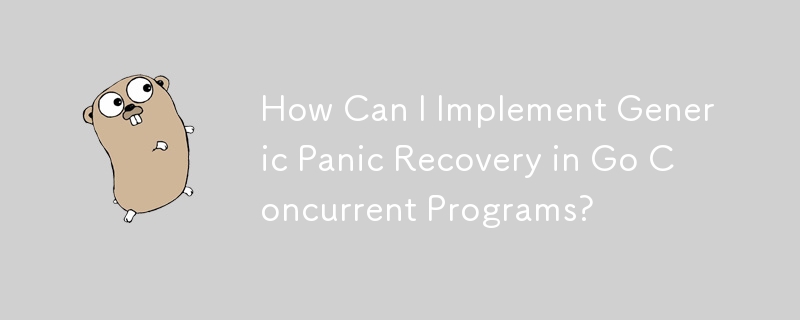

Generic Panic Recovery in Go Programs
In Go, it's often necessary to handle panics from concurrently running goroutines. However, a direct recover() approach is limited as it can only handle panics within the current goroutine. This article explores idiomatic methods to achieve generic panic recovery from arbitrary goroutines.
Deferring Panic Recovery
The idiomatic way to recover from a panic in a goroutine is to use deferred functions. A deferred function is executed when the current goroutine exits, even if the exit is caused by a panic. By including a deferred function that calls recover(), you can capture the panic and handle it gracefully.
go func() {
defer func() {
if r := recover(); r != nil {
fmt.Println("Caught:", r)
}
}()
panic("Go routine panic")
}()Injecting Recovery Functionality
In cases where adding a deferred function to every launched goroutine is impractical, you can create a named function that encapsulates the recovery logic and call it from within the goroutine.
func logger() {
if r := recover(); r != nil {
fmt.Println("Caught:", r)
}
}
go func() {
defer logger()
panic("Panic in goroutine")
}()Using a Wrapper Function
A simplified approach is to create a utility function that wraps other functions and handles panic recovery. This wrapper function can then be passed any function that needs to be made panic-safe.
func wrap(f func()) {
defer func() {
if r := recover(); r != nil {
fmt.Println("Caught:", r)
}
}()
f()
}
go wrap(func() {
panic("Panic in wrapped function")
})Conclusion
By leveraging deferred functions and function wrappers, it's possible to recover panics from arbitrary goroutines and handle them gracefully, ensuring the stability of Go programs. Remember to consider the best approach based on the specific needs of your application.
The above is the detailed content of How Can I Implement Generic Panic Recovery in Go Concurrent Programs?. For more information, please follow other related articles on the PHP Chinese website!




